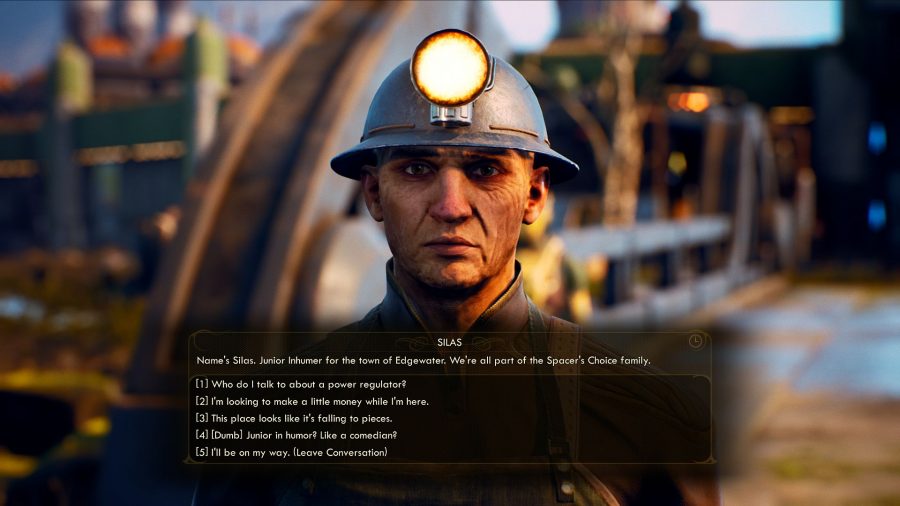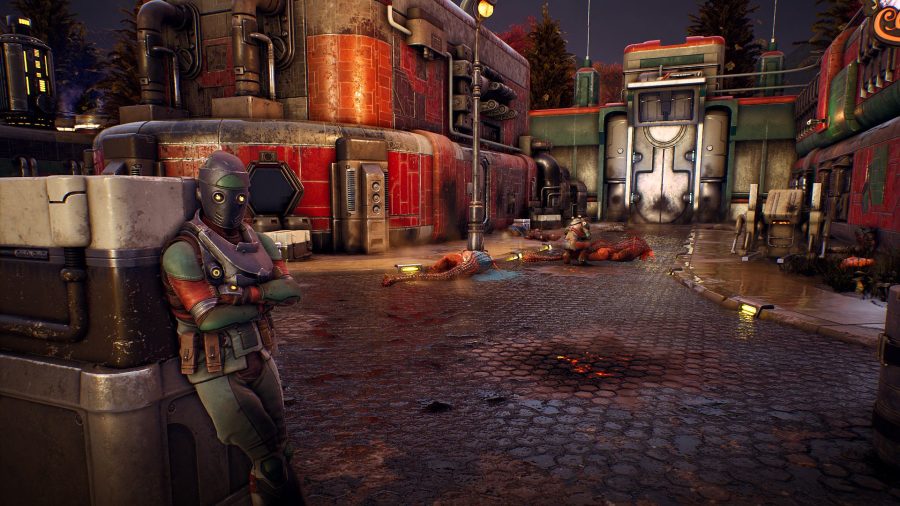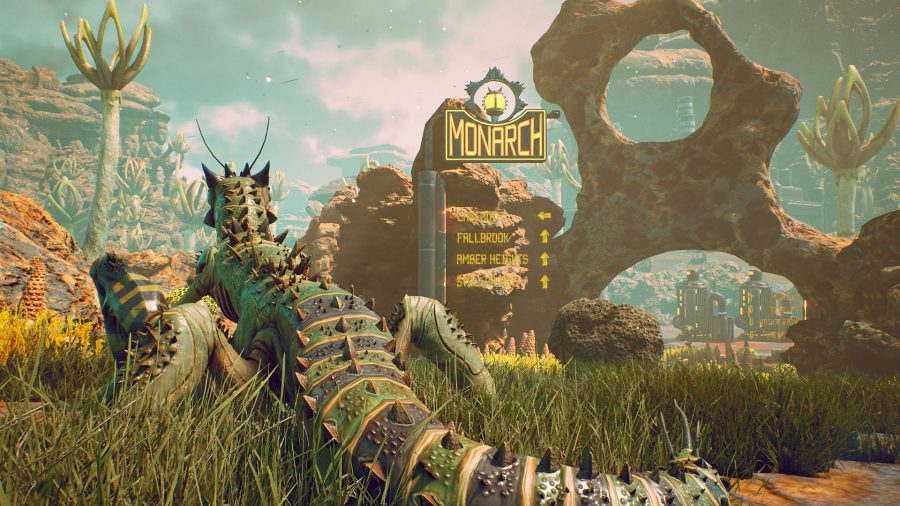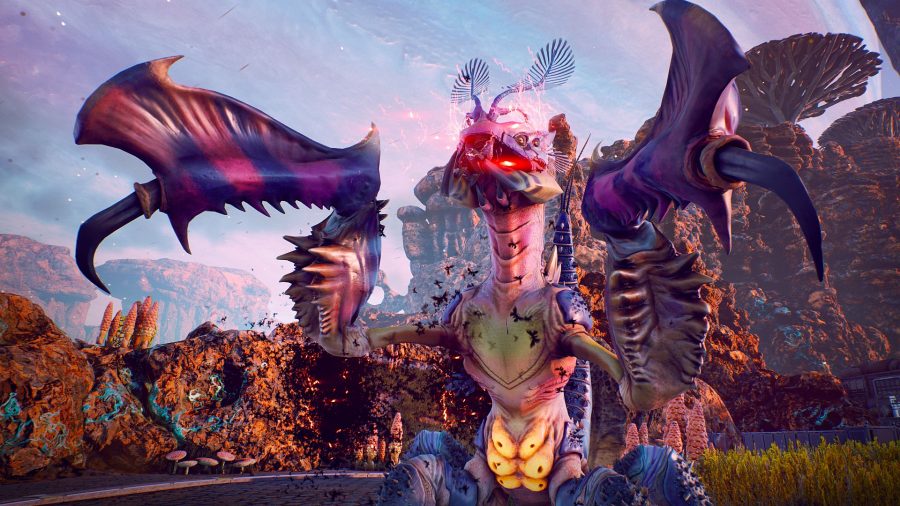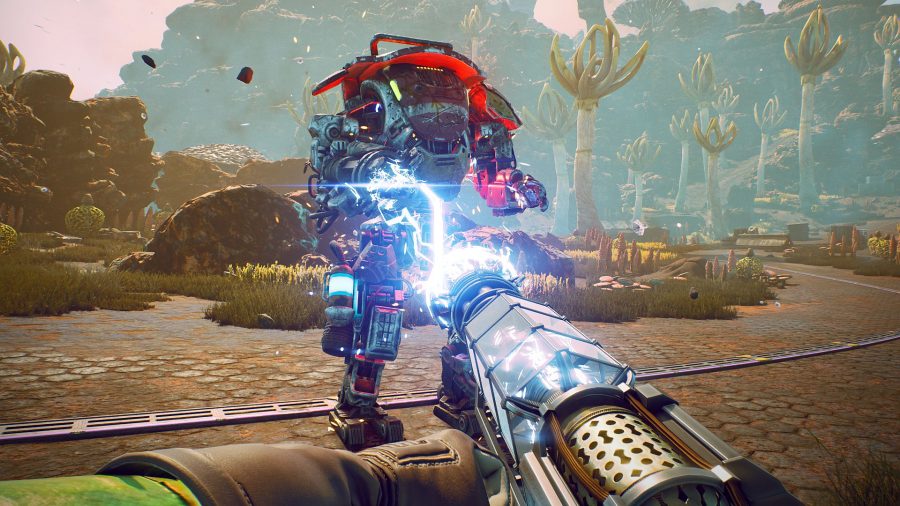The gaming industry has gotten old enough for us to witness the phase of "limp dick game design"?... my expectation was to see something much more brave and "breaking the formula" than what was produced in 18 months...
I dunno how could you have expected that.
Their goal from day one was a massive, consolidated target audience for their "retirement project". They literally said in an interview mainstream success was their goal.
-
Welcome to rpgcodex.net, a site dedicated to discussing computer based role-playing games in a free and open fashion. We're less strict than other forums, but please refer to the rules.
"This message is awaiting moderator approval": All new users must pass through our moderation queue before they will be able to post normally. Until your account has "passed" your posts will only be visible to yourself (and moderators) until they are approved. Give us a week to get around to approving / deleting / ignoring your mundane opinion on crap before hassling us about it. Once you have passed the moderation period (think of it as a test), you will be able to post normally, just like all the other retards.
You are using an out of date browser. It may not display this or other websites correctly.
You should upgrade or use an alternative browser.
You should upgrade or use an alternative browser.
The Outer Worlds Pre-Release Thread [GO TO NEW THREAD]
- Thread starter DosBuster
- Start date
Quillon
Arcane
- Joined
- Dec 15, 2016
- Messages
- 5,497
What is so hard to understand here for you?
Nothing. We are here for discussing shit and when you bring up their advantages, you have to take into account their disadvantages for the discussion's sake cos they are part of the whole, inversely proportional
I understand that. The point is, the disadvantages have always been there and always will. It's the advantages that they have never had before. Duh...What is so hard to understand here for you?
Nothing. We are here for discussing shit and when you bring up their advantages, you have to take into account their disadvantages for the discussion's sake cos they are part of the whole, inversely proportionalOtherwise there is no point for this discussion, you are just stating something and don't want it to be challenged.
Eisenheinrich
Scholar
Because a 3D-Game with talking people but no VA looks shit. BG had sprites, you don't even see the mouths of your characters. It's an ass old game and not suited to compare it to current titles as somewhat of a holy grail of game design.
"it has the perfect balance of VA and written ..." Shut up you imbecile.
Jesus people here are moronic, it's extreme.
"it has the perfect balance of VA and written ..." Shut up you imbecile.
Jesus people here are moronic, it's extreme.
ArchAngel
Arcane
- Joined
- Mar 16, 2015
- Messages
- 21,797
Deus Ex 1 has terrible VO that sometimes went to passable. New Deus Ex had decent VO but never good.You had noticed almost in there did you? What's one Bloodlines to everything else?
Deus Ex, every Piranha Bytes Game, New Vegas, I'd argue KOTOR 2.
Let me turn it around: what games with full VO would've been better without it? Other than Deadfire, I'm stumped. When you're playing a first person or third person over-the-shoulder ARPG, it's really immersion breaking to have unvoiced dialogue.
The problem is that there's a lot more money to be made in FPP/TPP action RPGs, so that's what gets funded. Full VO was a side effect of that. You're mistaking the symptom for the disease.
Bloodlines is way above it. New Vegas and Kotor also had it decent but never great (at least not the parts of New Vegas that I played).
Terenty
Liturgist
- Joined
- Nov 29, 2018
- Messages
- 1,476
New Vegas and Kotor also had it decent but never great (at least not the parts of New Vegas that I played).
New Vegas had particularly bad voice acting. Just a bunch of bored people reading their script. This alone killed any desire to finish the game
Obs' first KS had way better chance for them to "break the formula", they could literally propose anything and get the funding for it, f.i. if they proposed a spiritual successor to NV there instead of IE crap they'd have raised 10+ mil instead of 4 but they went for the safest option. With TOW they have a publisher even tho they say PD lets them to do whatever they want, PD probably isn't an idiot to blindly give them money, they wouldn't have agreed to any pitch from Obsidian. Tho they've agreed to that Ancestors game, its at least twice as small, made with 30 devs.
They did choose the safest option, but even with that they had no confidence of actually making the one million they were asking for. There were what, few people at the studio who believed in the pitch and rest were just in depression mode after really shitty few years?
vortex
Fabulous Optimist
In which universe does light propagation work thus:
In poverty universe with less investments.
Last edited:
Dishonoredbr
Erudite
- Joined
- Jun 13, 2019
- Messages
- 2,539
dat inspection

That's some really specific inspection. Also weapons seems to have abilities? Huh?
If half of these attributes (besides ammo and the other obvious ones) actually matter ingame, this will be amazing.
Lol at the youtuber for "this skill will be very useful if you are low on lockpicks". Dude, have you even played 1st person RPGs?
Lol at the youtuber for "this skill will be very useful if you are low on lockpicks". Dude, have you even played 1st person RPGs?
Elephantman
Unwanted
- Joined
- Apr 8, 2019
- Messages
- 253
nigger the game
have fun cucks
have fun cucks
Still waiting to see a single previewer who demonstrates awareness that Average isn't the lowest a stat can go. I want to see a min-maxed screenshot!
Dishonoredbr
Erudite
- Joined
- Jun 13, 2019
- Messages
- 2,539
Still waiting to see a single previewer who demonstrates awareness that Average isn't the lowest a stat can go. I want to see a min-maxed screenshot!
I think you gonna have to wait until Pax West/Gamescom or even until launch because it seems all preview that the same build or similar to the character , also Obsidian is being super secretive with the character creation so no preview was allowed to show it.
Jedi Master Radek
Arcane
- Joined
- Dec 12, 2013
- Messages
- 4,358
mini poll:
how much does this game cost in your region? how many loaves of bread you can buy with it?

jf8350143
Liturgist
- Joined
- Apr 14, 2018
- Messages
- 1,358
Just a quick question, what's wrong with F:NV's formula? Why do so many people want to break it? Is this some alternate dimension where CoD use the same formula as F:NV and people have been so sick of it they need to "shake it up a little bit" already?
jf8350143
Liturgist
- Joined
- Apr 14, 2018
- Messages
- 1,358
The footage they are allowed to show is all using the same character, which is described as being specifically build as a average character with slightly stronger leadship skills.Still waiting to see a single previewer who demonstrates awareness that Average isn't the lowest a stat can go. I want to see a min-maxed screenshot!
I think you gonna have to wait until Pax West/Gamescom or even until launch because it seems all preview that the same build or similar to the character , also Obsidian is being super secretive with the character creation so no preview was allowed to show it.
- Joined
- Jan 28, 2011
- Messages
- 100,389















Full interview with Brian Heins: https://www.pcgamesn.com/the-outer-worlds/interview
Here are the most absurd ways to play The Outer Worlds
We chat to Obsidian’s senior designer about the silliest ways to play the game and its ties to today’s world
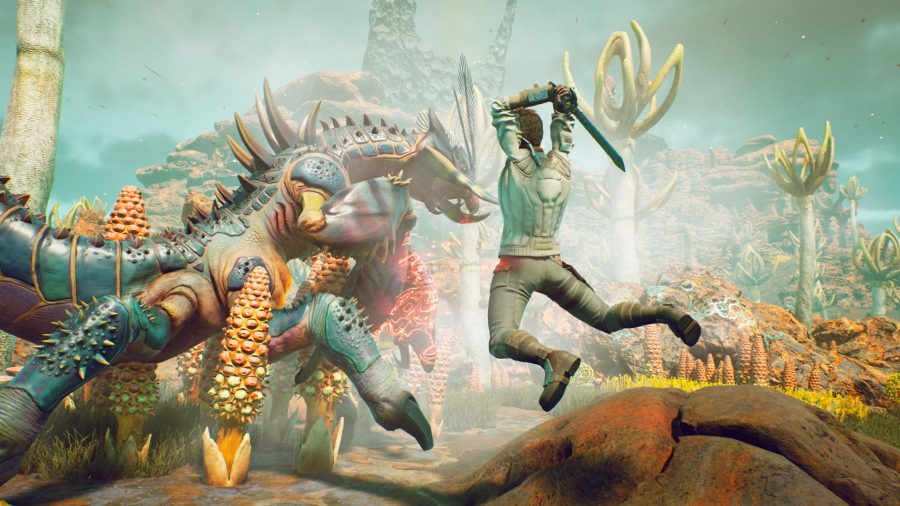
Everybody deals with the hopelessness and futility of existence in their own way. In a world flirting ever more coquettishly with authoritarianism and nationalism, it’s difficult to know what to do when it feels like you have very little say to resist it. Really, there’s only one thing you can do: laugh. With that in mind, when it comes to late October, I will cope with what may well be a no-deal Brexit by insulating myself with the chortle-a-minute riot that is Obsidian’s The Outer Worlds.
In an hour of The Outer Worlds gameplay, I’ve detected the nihilistic humour of the Fallout games, but also moments of unapologetic silliness. That said, there’s also satire in spades. This is a universe in thrall to gargantuan megacorporations that own you from cradle to grave and beyond as they terraform planets into uninhabitable hellholes for profit.
However, it hasn’t all been fun and games. The Outer Worlds’ Epic exclusivity has elicited strong feelings, most notably from former Obsidian writer Chris Avellone. Shortly after my hands-on with the game, I spoke to Obsidian’s senior designer, Brian Heins, about crunch, the most ridiculous ways you can play the game, and The Outer Worlds’ relationship with today’s turbulent world.
PCGN: The Outer Worlds’ flexibility is made manifest in the numerous builds you can create. What’s the maddest one you’ve seen?
Brian Heins: We did a UI revision, so you can’t do it currently, but someone actually went through character creation and gave himself the minimum possible on every single attribute – worst possible attribute scores, worst possible skill scores – and they never levelled their character up. They just kept going through the game to see how far they could get as the worst person in the colony, so that was entertaining to see them try.
In what way? What happened to them?
Because they had the lowest intelligence they got all the ‘dumb’ dialogue options. It was entertaining because they embraced the idea that they were just bad at everything. An NPC would say ‘can you do this farming’ and they’d be like ‘probably not, but I’ll give it a try’!
Could they complete the game?
They could, absolutely. But it was definitely challenging. At the time the game wasn’t completeable, but they got as far as they possibly could.
Given the various alliances in The Outer Worlds, all of whom you have a reputation with, what’s the trickiest situation in which a player has found themselves?
One of our producers on the game – his gameplay style is he doesn’t talk to anybody, he just shoots them. So, walking through town, he starts opening fire and killing people, just to see if you can play the game that way. And you can, but it’s a very lonely game! Everyone who could be a companion, he kills before they can do anything. Every quest giver, he kills, and you can complete the game entirely that way, but it is definitely much more challenging experience.
Some players try to play all sides, try to avoid making a choice between people who are opposing each other. But not everybody can be pleased, especially when you’re helping out their enemy. Then it came to the point where they actually need to make a decision that…
…will piss someone off.
Exactly. There’s a certain type of person that doesn’t want to make anybody angry. But there are also certain people that are just happy to work with you as long as you’re not working with their enemy.
There are two main endings. Can you keep playing after that?
No. When the game completes you’re shown how your choices ripple through the future of the colony.
Presumably there’s a time at which you can save before this?
We’ve created a save game right before you make the final choice, it says ‘hey, now you’re ending the game’, so you can always load that again and play more if you want to.
To me this is a game with real satirical bite. Could the world be more ripe for something like The Outer Worlds than right now?
I don’t know! I mean, obviously we weren’t very aware of the times and the culture as we were making the game, but yeah, with the corporate, financial situation the way it is, businesses the way they are – I think it’s very interesting that over the past couple of years comedy shows and sites are less like comedy and more like reality. I see an article from The Onion and I’m not altogether sure if it’s actually satire or just reporting.
I think with the humour of the game we’re taking the idea of corporate bureaucracy culture and extrapolating it to an extreme, but it’s still a relatable extreme because it’s all based in the situation we’re in as a society, definitely.
Over the course of the past two or three years, have your writers produced something that seemed ridiculous, but then became something like reality?
I can’t think of any examples off the top of my head, but I definitely know that people have talked about ideas that seem like ‘oh, that’s crazy, that would never happen’, and we have seen similar things, but not exactly that. Things like this business making this decision, or this PR spin that’s so obviously an attempt to pretend something’s not a problem when it is a problem.
I think that’s one of the things that makes the humour relatable – while you may not have intended a specific comparison, people will be able to derive their own comparisons from the humour of the situation, whether it’s a crappy customer service phone call that you’ve had to deal with, or trying to get an insurance agency to approve payment on something.
Do you think people will look back on The Outer Worlds as an important title given its cultural context?
It’s always hard for us to tell because we’re so close to it. I would love it if that was the case. I think that comes when a game resonates more than just within the year it was released, or something that people can play again and again and get something out of it.
On the one hand I would enjoy making something that continues to resonate with people. On the other I would love it if we change as a society, where that’s no longer relevant to people.
Then arguably there’d be no Outer Worlds?
It’s true.
What’s been Obsidian’s approach to crunch in relation to The Outer Worlds?
Obsidian is not a crunch studio, which is one of the things that keeps people staying there for a long time. We’ve had situations where, to meet a deadline for a week or so, they ask people to come in and put in extra time, but it’s always a request. And people who choose not to, or can’t because of family commitments or whatever, it’s fine, it’s not an issue at all.
There really hasn’t been a crunch or a death march or anything like that with the studio for quite a long time – as far as I can remember, anyway. That’s definitely one of the things that as a studio we’re very committed to. We’d rather cut something than try and get people to not have a life outside of the industry.
The Outer Worlds is an Epic exclusive, which has caused some controversy, most notably from Chris Avellone. How do you respond to that?
So ultimately the choice of where the game is published is Private Division’s decision. We really didn’t have any say in that matter at all. I didn’t actually see Chris’s comments.
Do those conversations filter through to the team as the game’s being made? Does it have any impact – perhaps on morale?
People have questions about why the decision was made. We had a team meeting where Feargus [Urquhart, Obsidian CEO] let us know what the decision was, why it was made, that sort of thing. Most of the team just wanted [to know] ‘does it affect the release date?’ and that kind of stuff, and the answer was no, so ultimately it hasn’t had an impact on the team with respect to getting the game done. We’re aware that some people have pretty strong feelings about it one way or another, and we’re just focused on making the game as good as we can.
Obviously it’s important for you and the team for as many people to play the game as possible. Is The Outer Worlds being on Xbox Game Pass important for that?
Xbox, PS4, Windows PC store, Game Pass, and the Epic store: there’s a lot of ways for players to purchase the game and enjoy it. Definitely I think Game Pass is a great option for players. We’ll see how it works out, but I’m hoping that, because a lot of people can get very intimidated by the scope of RPGs, being able to drop in and try it out to see if it’s their type of game – for however long it’s available on Game Pass – [is a good thing]. Then they can purchase it if they enjoy playing beyond that.
How do the writers strike a tonal balance between satire and fun with political topics that some players might resist?
So that’s one of those things that comes through iteration. Whenever we work on an area there are a few story points that Leonard and Tim want to make sure get hit by the writers. They’ll do a first pass, then play it through and give feedback.
Sometimes people will write a joke that’s just not landing. Some of it honestly is in delivery from the voice acting. Generally when we do an audio pass we do text-to-speech auto generation, which is very flat and monotone, and a lot of the things people laugh at now were just not funny when it was just text-to-speech.
As we were doing the VO for the narrative the writers were giving them the feedback, like what they intended to be funny, what the punchline was supposed to be, but the actual voice actors’ delivery brought a lot of life to the characters.
Wow, I had missed that: https://www.pcgamesn.com/the-outer-worlds/chris-avellone-epic-games-store
Chris Avellone calls The Outer Worlds exclusivity deal with Epic “a cash grab”
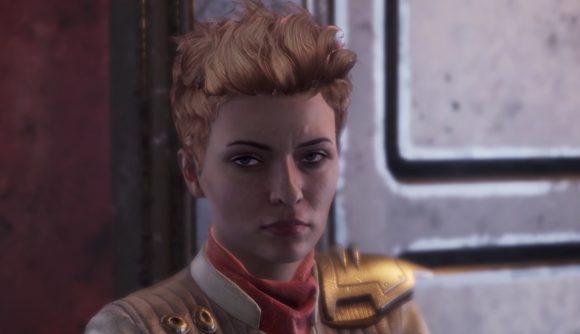
Former Obsidian writer Chris Avellone has some harsh words to share with his former company over its choice to take an exclusivity deal with Epic, putting The Outer Worlds on their store – and keeping it off of Steam, at least for a year.
The writer – who worked for Obsidian on Star Wars: Knights of the Old Republic 2, Fallout: New Vegas, Neverwinter Nights 2, Pillars of Eternity and more – calls the Epic Games Store exclusivity deal “a cash grab”. While at first he mostly blames Obsidian management for the deal, who he’s had a strained relationship with since he left the developer, he seems to eventually agree that Epic are also to blame.
His main worry seems to be that the news has turned the hype for The Outer Worlds from positive to profoundly negative, hype Avellone himself helped build up. “It’s how you kill the best hype you could have for a game,” he tweets, “Possibly best hype for any of the studio’s games, ever – then undermine it for a cash grab.”
The reveal that Obsidian’s The Outer Worlds would launch exclusively on Epic Games Store – and wouldn’t be coming to Steam until 2020 – appeared at Epic’s keynote address at GDC earlier this week. The response from fans, just like pretty much every announcement of this type, was profoundly negative. Avellone then weighed in with his tweet, which then set up a full thread on his feed.
After which he mostly responded to comments about alternative solutions, such as user Szogyenyi’s idea of selling it cheaper on Epic and full-price on Steam – “let the customer decide what is more important: the price, or the fact he owns every game at one place.” Avellone simply replied, “totally agree.”
On the other hand, Chris Avellone is very happy with Paradox Interactive for insisting that there would be “no exclusivity deal” with Vampire The Masquerade – Bloodlines 2, which he also worked on. Other than retweeting the confirmation, he also notes that “Paradox understands, and for that, I’m grateful.”
We can only hope that Dying Light 2 won’t go exclusive to the Epic Games Store either.
Last edited by a moderator:
Prime Junta
Guest
At this rate we're headed for a butthurt singularity. I fear for us.
fantadomat
Arcane








Everybody deals with the hopelessness and futility of existence in their own way. In a world flirting ever more coquettishly with authoritarianism and nationalism, it’s difficult to know what to do when it feels like you have very little say to resist it. Really, there’s only one thing you can do: laugh. With that in mind, when it comes to late October, I will cope with what may well be a no-deal Brexit by insulating myself with the chortle-a-minute riot that is Obsidian’s The Outer Worlds.
Infinitron where did you find that garbage article??? We may all shit on you from time to time mate,but i do respect you. Having to shift trough all that journo garbage out there,so you could bring a news post to the codexians goyz,it must be really painful. I would have become a serial killer by now if had to read all that brain diarrhea from a manlet children in their mid thirties still using dippers and spend half its day crying in the corner for about non issues.
 Now that i thing about it.....i don't know if you are a serial killer.
Now that i thing about it.....i don't know if you are a serial killer.Duraframe300
Arcane
- Joined
- Dec 21, 2010
- Messages
- 6,395
Infinitron where did you find that garbage article??? We may all shit on you from time to time mate,but i do respect you. Having to shift trough all that journo garbage out there,so you could bring a news post to the codexians goyz,it must be really painful. I would have become a serial killer by now if had to read all that brain diarrhea from a manlet children in their mid thirties still using dippers and spend half its day crying in the corner for about non issues.Now that i thing about it.....i don't know if you are a serial killer.
To be fair, theres multiple publications that try to turn Outer Worlds into their leftist dream game. Vice and Kotaku being on the forefront of that. They also twist words of the devs to fit their worldview and who could forget Jason Schreier asking Leonard Boyarsky if he's worried the game teaches fashism because you are able to side with the corperations.
Its easy to find them and Infinitron posts everything after all.
- Joined
- Jan 28, 2011
- Messages
- 100,389















Written by the same dude who wrote this: https://www.pcgamesn.com/the-outer-worlds/gameplay-fallout-obsidian (read the last paragraph)
PCGamesN is a very strange website.
PCGamesN is a very strange website.



















